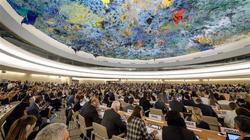 Iranian Ambassador and Deputy Permanent Representative to the United Nations (UN) Eshaq Al-e Habib highlighted how cruelly indigenous inhabitants of North America were killed by European settlers of Canada, and said that a country with such a dark history in human rights is so unfit to accuse others of violating rights.
Iranian Ambassador and Deputy Permanent Representative to the United Nations (UN) Eshaq Al-e Habib highlighted how cruelly indigenous inhabitants of North America were killed by European settlers of Canada, and said that a country with such a dark history in human rights is so unfit to accuse others of violating rights. He also touched upon unwavering support of the Canadian government for “apartheid” policies of Israel against Palestinians, and added that modem cases of blatant violation of human rights by the Canadian government not let the past cases be taken as bygones.
“How does Canada reconcile its contradictory behaviors?” the Iranian diplomat said, describing the Canadian government’s self-proclaimed advocacy of human rights as a case of double standards.
“It cannot go both ways,” Al-e Habib said adding that Canada cannot “pose itself as a human rights defender in Iran? It only exposes a typical case of hypocrisy.”
“The fact is that behind nice gestures, little have changed. No amount of gentle double talks may conceal the racism, inconsistency and hypocrisy that is so deeply rooted in Canada’s political system,” he categorically denounced Ottawa’s biased behavior.
He once again echoed Tehran’s condemnation of Westerners’ instrumental use of the issue of human rights.
“This session is simply another occasion in which the subject of human rights is being exploited, by the countries which cannot care less about it. This is simply another episode of a pattern that further exposes dishonesty and hypocrisy on the part of certain players with the darkest human rights records,” the senior diplomat underlined.
“However, we continue to view this resolution as a purely politicized and counter-productive move. It has no bearing on the actual cause of human rights. No amount of smear campaign or pressure and intimidation campaign to collect vote for this resolution would change the obvious fact that this text has nothing to do with the cause of the human rights,” noted the envoy.
Late on Thursday after the UNGA 3rd Committee’s approval of a resolution of human rights against Iran, Iranian Foreign Ministry Spokesman Seyed Abbas Mousavi denounced the move, describing the move as an instrumental and political use of the issue of human rights by countries which are notorious for violating the rights.
“The adoption of human rights resolution against Iran reflects double-standard and hypocrisy of its sponsor and accordingly, it lacks credibility and legitimacy,” he added.
Criminals of the current era, who are staunch supporters of the resolution, have spared no efforts in committing crimes against humanity, ranging from killing children to dismembering critics and exerting economic terrorism against the independent nations, Mousavi underlined.
The diplomat termed the approval of the resolution as “unilateral and unrealistic” and added, “This resolution is put forward against Iran at a time when one of the chief supporters of this resolution, i.e. US, is violating the most basic rights of over 83 million Iranian people specially women, children, the elderly and patients.”
Accordingly, Iran strongly condemns the instrumental and political use of human rights by Western countries against the independent nations.
“From the perspective of the Islamic Republic of Iran, Universal Periodic Review (UPR) mechanism of Human Rights Council is the proper mechanism for the evaluation of human rights in countries which review human rights in all countries without any discrimination,” he emphasized.
For Iran, observing human rights is the legitimate and religious requirements in line with national security and interests, Mousavi emphasized.
All five Central Asian countries (including Kazakhstan, Kyrgyzstan, Turkmenistan, Tajikistan and Uzbekistan) opposed the UN General Assembly’s human rights resolution against Iran and voted against the move unanimously.
Other countries such as Afghanistan, Armenia, Belarus, China, Iraq, Pakistan, Russia and Syria also opposed the resolution against Iran.
Totally, 66 countries gave abstention vote and 30 countries voted against the resolution.
Iran has always been critical of the Westerners’ instrumental use of international mechanisms and organizations like the UN and its subsidiary parts.
On Wednesday, Iranian Deputy Foreign Minister for Legal and International Affairs Gholam Hossein Dehqani had rapped the UN Security Council for adopting a double-standard approach towards different regional and international issues.
Dehqani made the remarks in Tehran in a meeting with Director-General for Multilateral Affairs of the Belgian Foreign Ministry Axel Kenes, whose country is a non-permanent member of the UN Security Council.
During the meeting, Dehqani criticized the UNSC for its Secretariat's reports on implementation of Resolution 2231 that has been released without showing any attention to the US repeated violations of the nuclear deal and the resolution, and stressed the need and importance of the opposition of the UNSC member states to the US unilateralism and instrumental use of the UN bodies.
According to Fars News Agency, he also referred to the UNSC's unilateral approach on issues like Yemen and its insufficient attention to the humanitarian dimensions of such crises, calling on Belgium as a non-permanent member of the UNSC to make more efforts to resolve them peacefully.
Resolution 2231 was a resolution endorsing the Joint Comprehensive Plan of Action (JCPOA) on the nuclear program of Iran. It sets out an inspection process and schedule while also preparing for the removal of United Nations sanctions against Iran.
Washington withdrew from the internationally-endorsed 2015 nuclear deal with Iran on May 2018, re-imposed the toughest-ever sanctions against the country and started a plan to zero down Tehran's oil sales.
Under the nuclear agreement reached between Iran and six world powers in July 2015, Tehran undertook to put limits on its nuclear program in exchange for the removal of nuclear-related sanctions.